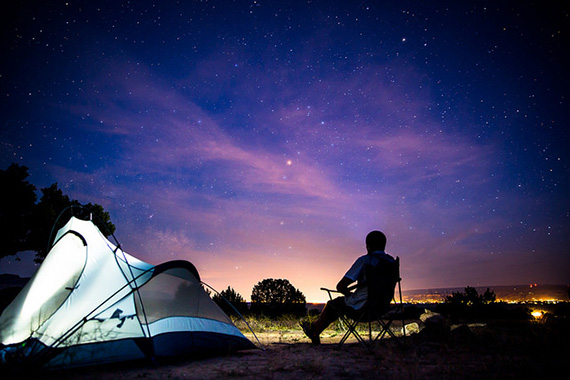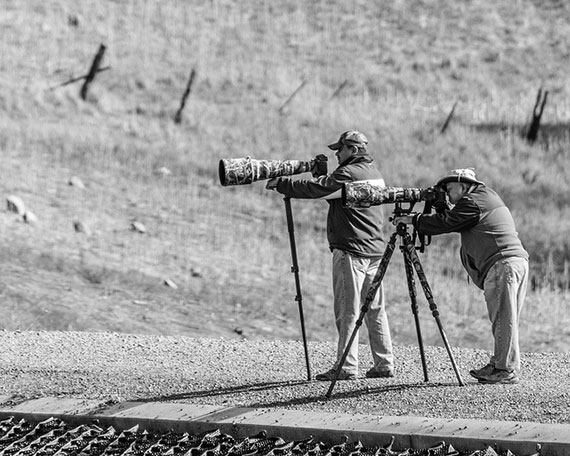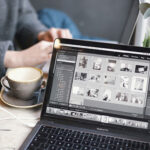Good photographers try to be prepared for almost any situation. Unfortunately, if you tried to carry everything you’d need to meet every possible contingency in the field, you’d have to pack like a Bedouin trader.

photo by Zach Dischner
Many times that simply isn’t possible. So seasoned photographers learn to be resourceful. Here are a few miscellaneous tips that can save your back and wallet, particularly on short trips near home.
Use a Monopod
In all but the most extreme lighting situations, a monopod can substitute nicely for a tripod and is a lot easier to carry. With practice you’ll be able to hold a monopod nearly as stable as a tripod—for a short time anyway.
One trick for stabilizing a monopod is to wrap the camera strap around your upper arm and push on the monopod while exerting gentle backward pressure on the strap. Similarly, you can place a large clamp on your monopod and use it as a shoulder brace, almost like a gun mount. It might look a little funny, but it works surprisingly well.

Photo by Don DeBold
Work With Sand
For those times you have to drag a tripod to the beach or sandy area, grab three tennis balls on the way out the door. Cut a hole big enough for a tripod leg and fit a tennis ball over each end.
The tennis balls won’t sink in the sand, will keep most of the grit out of the end of your tripod leg, and can be thrown away when you’re finished.
Another great thing about working at the beach is you don’t need to carry sandbags. Just bring empty bags. There’s usually plenty of sand already on the beach. Sandbags are priceless for weighting reflectors, which tend to act like sails in ocean breezes.
Bring a Cooler
Coolers have several advantages over equipment cases in many situations. They’re solid, have handles and wheels, and they can be used to sit or stand on in a pinch. If you lose or break a cooler, you’re only out about $40.

Photo by Anton Sharov
You can still carry drinks with the camera gear carefully. Get the kind of drink cozies that you put in the freezer. They will keep your drinks cold without bringing down the temp too much in the cooler. The last thing you want to do is bring cold optics or a camera out into a warm, muggy atmosphere. Expect instant condensation if you do.
Carry a Bag of Rubber Bands
They’re just so handy for so many things and so easy to carry. You can use them for emergency repairs and to keep papers from flying away.
A fat rubber band is handy for dislodging a stuck filter. Wrap the rubber band around the edge of the filter; it should give you enough grip to get it loose.
Create an Incident Light Meter
Many photographers still carry light meters, even in the days of high-end DSLRs. If you’re packing light, you can use a Styrofoam cup over the end of your lens and use your camera’s light meter. Hold the cup in place with one of your rubber bands.
Record the exposure of the inside of the cup at the subject’s position, pointed toward where the camera will be, then walk back to shoot the picture. Note that Styrofoam cups do come in different thicknesses, so you may want to calibrate yours using the Sunny 16 rule before you leave home.
About the Author:
Peter Timko writes on behalf of Proud Photography, which offers online photography courses on a variety of subjects.
Like This Article?
Don't Miss The Next One!
Join over 100,000 photographers of all experience levels who receive our free photography tips and articles to stay current:





Love photo tips. One of the photo magazines, Popular Photography used to have a section every month. Thanks very much!
I’m an Amateur photographer for the last thirty years or so, I drive a cab in Dublin, Ireland, when things go quiet I take this opportunity to get some dawn shots, or night time shots, I have improvised a microwavable neck warmer, which is essentially a bean bag, and I use this to great effect either on the dash of the car, or moulded on the window frame of the door, always remembering to switch off the engine and any fans that might be running, hope this helps.
I use the rubber band technique to dislodge my UV filter when it gets stuck- great minds think alike!
That tennis ball tip just may be priceless.
But why would you throw them away? Why not re-use them next time?